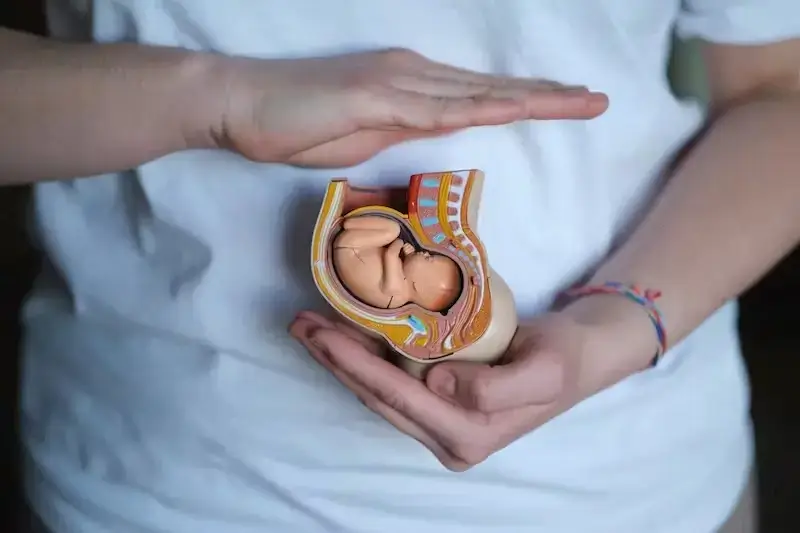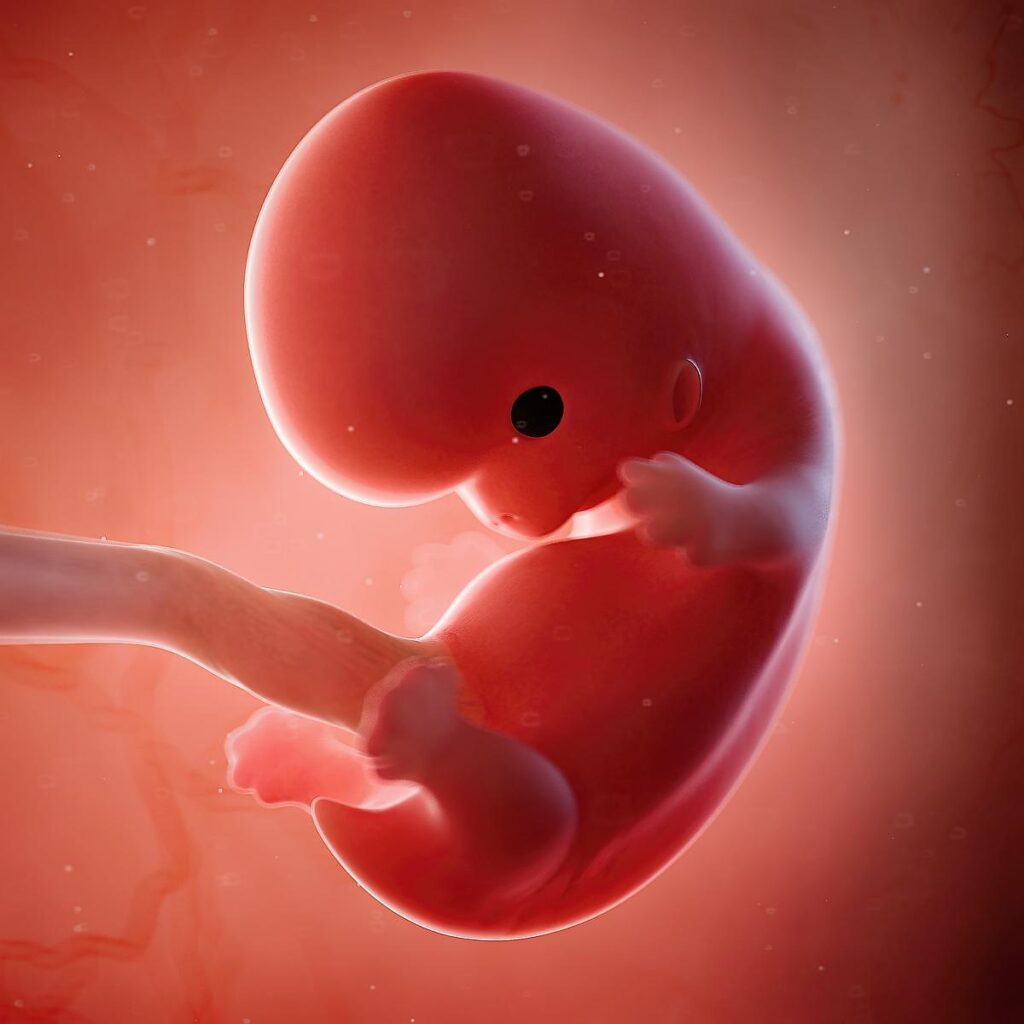
If you are 8 weeks pregnant, your baby has now reached the size of a gooseberry and continues to grow. Your body is changing as well, and it’s not only your growing bump, as you may expect nausea and feeling unexpectedly emotional.
8 Weeks Pregnant – Fetus

At 8 weeks pregnant, the embryo is still tiny, now measuring 0.63 inch/ 1.6 cm and weighing about 0.04 of an ounce/ 1 gram, but he keeps growing at an amazing rate of approximately one millimeter a day. You won’t be able to feel the embryo’s light movements yet, but he is now moving his body and budding limbs. The hands and feet are developing webbed fingers, and the reptilian-like tail that has been there since week 5 is almost gone. The delicate eyelids continue to develop, now almost covering the eyes, the nose and the upper lip are now distinguishable and the heart beats at the rate of 150 per minute. Your baby’s brain is still very primitive, but neural pathways are already forming, and so are the lungs. It’s still way too early to know whether it’s a boy or a girl.
Related: Symptoms and Treatment of Partial Molar Pregnancy
8 Weeks Pregnant – Symptoms
Meanwhile, you body is changing too. The 8 weeks pregnant belly is almost as it used to be before pregnancy, but it is soon to change; your uterus keeps growing with the embryo and amniotic fluid increases in quantity by about two tablespoons a week. Due to rising levels of hormones your breasts might already be growing, preparing for lactation, and will keep growing thorough the pregnancy. Bear in mind that you will probably need a larger bra size. Rising hormone levels (progesterone in particular) are also responsible for feeling exhausted and having no energy whatsoever – especially in the evening. Nausea might explain that, too – constant vomiting can make one extremely tired. It might be called morning sickness, but many women suffer from nausea all day and even during the night. And yes, once again, it’s the hormones who are to be blamed, along with changes in muscles of the uterus and the digestive tract due to pregnancy.
Other possible “charming” symptoms include headaches, occasional cramps, an irresistible urge to pee at inconvenient times, food cravings and aversions, light spotting, usually lasting between a day and three, annoying mood swings (turning into an emotional wreck of no apparent reason will be a more accurate description), heightened sense of smell, persisting thorough the first trimester for some women, increased vaginal discharge and, last but not the least, constipation. One reason for it is the growing uterus, which leaves your bowels less space. The other is, once again, the pregnancy hormones, that relax the bowel muscles, making them work slower so that nutrients have more time to be absorbed into the bloodstream and more of them reach the growing baby. The third reason is the iron supplement you might be taking. Ask your care provider for a gentler supplement – they might be more expensive but they’re worth the price. What you can do is drink more fluids, add fiber-rich foods to your meals and do your best to exercise during pregnancy. Physical activity is great – according to a recent study, it is the only thing that can ease your back pain during pregnancy. It will also improve your sleep and might relieve constipation by encouraging more active bowel movements.
At 8 weeks pregnant, weight gain is probably minor, if at all. You shouldn’t gain more than three to four pounds during the first trimester and if you’re suffering from nausea, you might even lose a little weight. Once the nausea has subsided and you’re able to eat normally, you will probably begin gaining weight, reaching a gain of about 14 pounds in your second trimester. Steady weight gain is extremely important for your growing baby who needs all the nutrients you can supply him with with (and so do you!), so make sure you keep to a healthy, nutrient-rich pregnancy diet.
Related: 10 Tips to Relax in Pregnancy
8 Weeks Pregnant – Questions
During the first trimester, your doctor or midwife will offer you a range of blood tests, testing for Down syndrome and other medical conditions, and checking for anemia, immunity to German measles and a few sexually transmitted diseases such as HIV, hepatitis C and more, and possibly a urine test (confirming your pregnancy if necessary and looking for a possible kidney infection). Later on, you may be offered to undergo genetic tests and counseling (the latter will depend on your family and/or ethnic background). The tests and counseling will identify the risks you have of passing on inheritable diseases such as Tay-Sachs, cystic-fibrosis, Canavan’s disease etc. to your baby.
1. Should I Undergo Genetic Testing?
You don’t have to undergo genetic testing and counseling. Many want to avoid the stress of the testing or refuse it due to religious beliefs. You may want to consider genetic testing and counseling in one or more of the following applies to you:
- You’re over the age of 35, have a chronic health problem, received abnormal results on screening tests or were exposed to dangerous toxins.
- You’ve had a miscarriage three times or more.
- You have children or family members with birth or genetic defects.
- You’re of African-American descent (high risk of passing on sickle-cell anemia)
- You’re of Eastern European Jewish descent (high risk of passing on Tay-Sachs or Canavan’s disease)
- You’re of Mediterranean or Southeast Asian descent (high risk of passing on the blood disorder thalassemia)
Related: 9 Weeks Pregnant – Fetus
Related: Should I Avoid Caffeine In Pregnancy?



